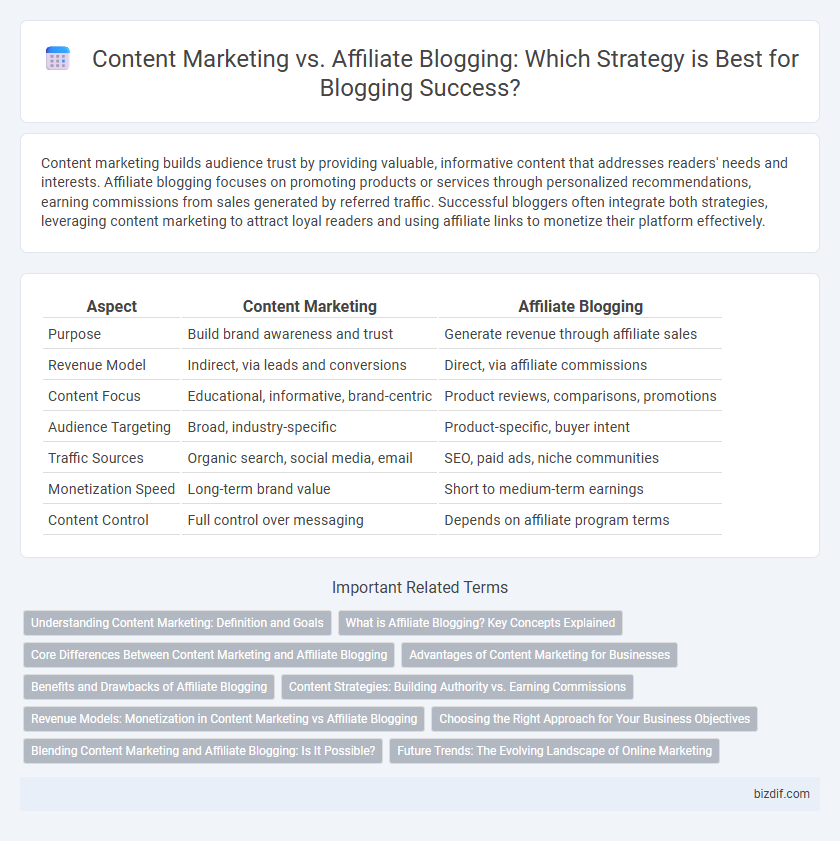Content marketing builds audience trust by providing valuable, informative content that addresses readers' needs and interests. Affiliate blogging focuses on promoting products or services through personalized recommendations, earning commissions from sales generated by referred traffic. Successful bloggers often integrate both strategies, leveraging content marketing to attract loyal readers and using affiliate links to monetize their platform effectively.
Table of Comparison
| Aspect | Content Marketing | Affiliate Blogging |
|---|---|---|
| Purpose | Build brand awareness and trust | Generate revenue through affiliate sales |
| Revenue Model | Indirect, via leads and conversions | Direct, via affiliate commissions |
| Content Focus | Educational, informative, brand-centric | Product reviews, comparisons, promotions |
| Audience Targeting | Broad, industry-specific | Product-specific, buyer intent |
| Traffic Sources | Organic search, social media, email | SEO, paid ads, niche communities |
| Monetization Speed | Long-term brand value | Short to medium-term earnings |
| Content Control | Full control over messaging | Depends on affiliate program terms |
Understanding Content Marketing: Definition and Goals
Content marketing involves creating and distributing valuable, relevant content to attract and engage a target audience, aiming to drive profitable customer actions. Its primary goals include brand awareness, customer loyalty, and lead generation, focusing on long-term audience relationships rather than immediate sales. This approach contrasts with affiliate blogging, which primarily targets direct conversions through promotional links and commissions.
What is Affiliate Blogging? Key Concepts Explained
Affiliate blogging involves creating content that promotes products or services with the goal of earning commissions through affiliate links embedded within the blog posts. Key concepts include selecting a profitable niche, building trust with the audience through authentic reviews, and strategically placing affiliate links to maximize conversions. Successful affiliate bloggers leverage SEO, keyword research, and audience engagement to drive traffic and increase affiliate revenue.
Core Differences Between Content Marketing and Affiliate Blogging
Content marketing primarily focuses on creating valuable and informative content to attract and engage a target audience, aiming to build brand authority and long-term relationships. Affiliate blogging centers on promoting products or services through affiliate links, generating revenue based on user conversions and commissions. The core difference lies in content marketing's emphasis on brand storytelling and audience education, whereas affiliate blogging prioritizes direct monetization through affiliate partnerships.
Advantages of Content Marketing for Businesses
Content marketing drives sustained brand awareness by creating valuable, relevant content that attracts and engages target audiences, leading to higher customer retention and trust. It improves SEO performance, boosting organic traffic and long-term visibility on search engines, which enhances lead generation without relying solely on paid ads. Businesses leveraging content marketing also gain authority in their industry, fostering stronger customer relationships and increased sales conversions over time.
Benefits and Drawbacks of Affiliate Blogging
Affiliate blogging offers the benefit of generating passive income through commission-based sales, making it a scalable monetization strategy for bloggers with large or niche audiences. However, the drawback lies in its dependency on third-party products and fluctuating affiliate programs, which can impact revenue stability and control over content quality. Content marketing, by contrast, emphasizes building brand authority and audience trust through original content, though it requires significant time and resources before tangible returns are realized.
Content Strategies: Building Authority vs. Earning Commissions
Content marketing emphasizes creating valuable, informative content to build authority and foster long-term audience trust, often leveraging SEO techniques and in-depth articles. Affiliate blogging prioritizes promoting products or services through persuasive content aimed at driving conversions and earning commissions, integrating affiliate links strategically within posts. Effective content strategies balance authentic storytelling with targeted calls-to-action to maximize revenue while maintaining credibility.
Revenue Models: Monetization in Content Marketing vs Affiliate Blogging
Content marketing generates revenue through diverse monetization strategies such as sponsored content, digital product sales, and subscription models, creating multiple income streams. Affiliate blogging primarily relies on commission-based revenue by promoting third-party products and earning a percentage of sales through referral links. Understanding the distinct revenue models helps marketers optimize their approach to maximize profitability in each domain.
Choosing the Right Approach for Your Business Objectives
Content marketing and affiliate blogging serve distinct purposes in digital strategy, with content marketing focusing on building brand authority through valuable information and affiliate blogging prioritizing revenue generation via product promotion. Choosing the right approach depends on business objectives: content marketing suits long-term brand growth and audience engagement, while affiliate blogging drives immediate sales and commission-based income. Analyzing target audience behavior, revenue goals, and resource allocation ensures the implementation aligns effectively with overall business strategy.
Blending Content Marketing and Affiliate Blogging: Is It Possible?
Blending content marketing and affiliate blogging is not only possible but also highly effective in driving both brand awareness and revenue. By integrating valuable, targeted content with strategically placed affiliate links, bloggers can enhance user engagement while maximizing commission opportunities. This hybrid approach leverages SEO best practices and authentic recommendations to build trust and sustain long-term audience growth.
Future Trends: The Evolving Landscape of Online Marketing
Content marketing is increasingly leveraging AI-driven personalization and immersive experiences like AR and VR to engage audiences deeply, while affiliate blogging is evolving through data-driven influencer partnerships and automated tracking tools that enhance revenue attribution. Both strategies are integrating advanced analytics and consumer behavior insights to optimize targeting and conversion rates amid rising privacy regulations and platform algorithm changes. Future trends indicate a convergence where content quality and affiliate strategies blend seamlessly to create authentic, value-driven marketing ecosystems.
Content Marketing vs Affiliate Blogging Infographic

 bizdif.com
bizdif.com